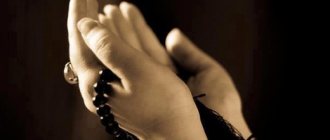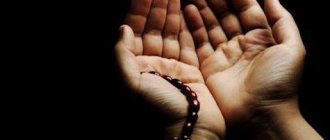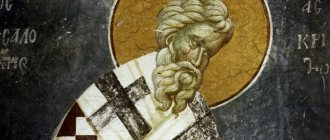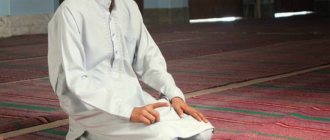- What is salavat?
- Pronunciation options and translation Second version of salavat
- Intercession of the Prophet ﷺ
Salawat (صلوات) is the plural form of the word “salaat”, which translated means “prayer”, “salawat to the prophet” - this term means “blessings offered to the Prophet” ﷺ. Salawat to the Messenger of Allah ﷺ is an expression by Muslims of love for him, also an expression of their hope for the intercession of the Prophet Muhammad ﷺ on the Day of Judgment, as well as an expression of gratitude to him and respect for him.
The life of the Prophet Muhammad ﷺ is an example of the most perfect human life ever lived by anyone on earth. All Muslims and many non-Muslims look to his actions and words as the most worthy example. The Almighty said that “ in the Messenger of Allah there is an exemplary example for those who hope for the mercy of Allah... ” (Surah Al-Ahzab (The Allies), verse 21).
Pronunciation options and translation
Listen and download the correct reading of the above salavat:
The text of the salawat to the Prophet Muhammad ﷺ in its transliteration sounds like this:
Allahumma sally 'ala Muhammadin wa 'ala ali Muhammadin, kya-ma sallayta 'ala Ibrahima wa 'ala ali Ibrahima, inna-kya Hamidun, Majidun. Al-lahumma, barik 'ala Muhammadin wa 'ala ali Muhammadin kya-ma barakta 'ala Ibrahima wa 'ala ali Ibrahima, inna-kya Hamidun, Majidun!
Translated, the meaning of the text means: “ O Allah Almighty, bless Muhammad and his family, as You blessed Ibrahim and Ibrahim’s family, truly You are Worthy of Praise. Glorious! O Allah Almighty, send blessings to Muhammad and his family, as You sent them to Ibrahim and his family, truly You are Praiseworthy, Glorious! "
The second version of salavat
Listen and download the correct reading of the above salavat:
Another version of the text of the salavat to the Prophet Muhammad ﷺ sounds in its transliteration as follows:
“Allahumma, sally 'ala Muhammadin wa 'ala azwaji-hi wa zurriyati-hi kya-ma sallayta 'ala ali Ibrahima wa barik 'ala Muhammadin wa 'ala azwaji-hi wa zurriyati-hi kya-ma barakta ala ali Ibrahima, inna- kya Hamidun, Majidun! Translated, the meaning of the text means: “ O Allah Almighty, bless Muhammad, his offspring and wives, as You blessed Ibrahim’s family, and send blessings to Muhammad, his offspring and his wives, as You sent them to the family of Ibrahim, truly You are Worthy praise, Glorious One! "
When a Muslim mentions the name of the Prophet of Allah ﷺ, or the name of the Prophet Muhammad ﷺ is mentioned in his presence, one should say the words: “ Allahumma salli ‘ala Muhammad ,” or “ Allahumma salli ‘ala Muhammadin wa ‘ala ali Muhammad ,” or say the words: “ Sallallahu alayhi wa sallam ,” which translated means “ Peace and blessings of Allah be upon him .”
In calligraphy, as well as when printing in texts, a short type of salawat is used, indicated by the symbol ﷺ - which is written in Arabic as:
صلى الله عليه وسلم
in the transcription it reads as “ sallallahu alayhi wa sallam ”, and when translated into Russian this text means “ peace and blessings of Allah be upon him ”.
Let's learn salavat
Salawat is a mercy from Allah associated with the exaltation of His Prophet (PBUH), and from all creation, i.e. from people, angels, jinn and inanimate nature, this is a dua (supplication) for the Prophet (sallallahu alayhi wa sallam). The purpose of our salawat is to ask for the beloved Prophet (sallallahu alayhi wa sallam) mercy and exaltation beyond what has been given Allah before him. And when reading salawat, the Prophet (pbuh) receives great benefit. In the same way, he benefits from reading the Qur'an and dhikr for it or giving sadaqa. Although he is perfect, his perfection can increase without end. At the same time, Allah elevates him in degree every time salawat is recited for him or other good deeds performed for his sake. Allah has endless rahmat (Mercy) to exalt the Prophet (pbuh).
Many hadiths speak about the dignity and value of reciting salawat to the Prophet (sallallahu alayhi wa sallam). These include the following statements of the Prophet (PBUH): “Whoever writes salawat in a book, the angels do not stop asking for forgiveness for him as long as my name remains written.” “If anyone wants to meet Allah in such a way that He is pleased to them, let him read salavat more for me.”
“Whoever increases the recitation of salawat for me in life, then Allah commands all created things to ask for forgiveness of his sins after his death.” “The Archangel Gabriel came to me and said: “O Muhammad, if someone recites salawat for you, then 70,000 angels will read salawat for that person. And the one for whom the angels read salavat is an inhabitant of Paradise.”
“Whoever reads salawat for me once, then Allah will read salawat for him 10 times, if he reads 10, then Allah will read 100 times for him, if he reads 100 times, then Allah will read 1000 times. And for whom He read the salavat 1000 times, for that Hell will become forbidden, and he will firmly stand on the true word in this world and in the Akhirat during interrogation, and he will be sent to Paradise, and the salavat read for me will come to him like a nur, illuminating The Sirat Bridge is 500 years long, and Allah will give him a palace in Paradise for every salawat.”
There are other hadiths about this.
Some said that in salavat there are 10 carats (mercies, miracles), which the one who reads it receives:
1. Salavat from the Lord of the Worlds (Allah). 2. Shafaat (intercession) of the Prophet (pbuh) - the chosen one of Allah. 3. Following the most pure angels. 4. Opposition to munafiks (hypocrites) and kafirs (infidels). 5. Deliverance from sins and misdeeds. 6. Help in satisfying desires. 7. Nourish illumination of body and soul. 8. Salvation from Hell. 9. Receiving a home of joy - Paradise. 10. Salam from the All-Merciful and Forgiving Allah. About the merits of some forms of Salavat
The value of the salawat "Al - Fatiha" "Allahumma salli 'ala sayyidina Muhammadinil fatihi lima ugliqa valhatimi lima sabak'a nasyril haqqy bill haqqy valhadi ila syratykal mustaqym wa 'ala alihi haqqqa qadrihi wa miqdari hil 'azim."
The Prophet (PBUH) said: “The Salat al-Fatih prayer is equal to six hundred thousand salawat prayers, and each of them is equal to four hundred marches.”
“Whoever reads (Salavatul-Fatiha) at least once in his life will not enter Hell. Reading it once is comparable to reading 10,000 other salawat, as well as reading the entire Quran 7 times” (Talkhisul-maarif)
“Know that if you perform all the prayers, adhkars, salawat to the Prophet (PBUH), read dua for a hundred thousand years and do all this a hundred thousand times every day, then the reward for this will not reach the reward for one reading.” salawat al-fatih" (Jawahir al-Maani)
“Salavatu an - Nariyat” - The secret formula of happiness “Allahumma ssalli salyatan kamilyatan, wa salim salyamantamman 'ala saididina Muhamadinil llazi tanhalyu bihil 'ukad, wa tanfarizhubihil kurabu, wa tukza bihil havaizhu wa tunalu bihi ragaibu wa husnulhavatim . "Va justaskal gamamu bivazhihil karimi wa 'ala alihi vasahbihi fi kuli lamhatin wa nafasin bigadadi kuli maglyummillak."
“Whoever recites this salawat every day 41 times or 100 times or more, the Creator of all creation will grant him relief from all his difficulties and problems. He will protect him from any harm that may threaten, and will give ease in all his affairs. His soul will be illuminated by the light of the Almighty, his lot (rizq) will increase, the gates of blessings will be opened for him, his instructions will be accepted, when he is in power, he will be insured against all troubles and misfortunes of time, saved from hunger and poverty. Allah Almighty will instill honor and respect for him in the hearts of people. Allah will not refuse him whatever he asks.” (Imam al-Qurtubi)
Sheikh Muhammad at-Tunisi said: “Whoever recites this salawat 11 times every day will receive inheritance like pouring rain - and like a plant growing out of the ground.” They also say that this salawat is a treasure from the treasures of the Almighty, and reading it is the key to these treasures: they are opened for those servants of Allah who constantly read it - and thereby they can achieve what they desire. It is also read during a serious illness for the sake of healing - and by the will of the Almighty, the patient’s condition improves.
Salavat “Kamaliyat “Allahumma salli wa sallim wa barik 'ala sayyidina Muhammadin wa 'ala alihi kama la nihayata likamalika wa 'adada kamalihi.” This is one of the most valuable forms of salavat. It is said that reading it once is equivalent to 70 thousand salavat, others say – to 100 thousand. It should be read between evening and night prayers to improve memory (Afzalu ssalawat).
About the next salavat, the author of the book “Afzalu ssalavat” said that the reward for it has no end and it is equal to 14 thousand salavat. Here is this salawat: "Allahumma salli wa sallim wa barik 'ala sayyidina Muhammadin wa 'ala alihi 'adada kamalillahi wa kama yaliku bikamalyahi."
The next salawat: "Allahumma salli 'ala ruhi sayyidina Muhammadin fil arvahi wa 'ala jasadihi fil azhsadi wa 'ala kabrihi fil kuburi wa 'ala alihi wa sahbihi wa sallim." Imam al-Sha'rani conveyed what the Prophet (PBUH) said about this salawat: “Whoever repeats these words will see me in a dream. Whoever sees me in a dream will see me on the Day of Judgment. And whoever sees me on the Day of Judgment, I will help him. Whoever I help will drink from my hawza (reservoir), and his body will be forbidden to the fire of Hell.” The interpreter of “Dalail” from Fakahani also remembered this, also speaking about an increase in remuneration by 70 times.
"Allahumma salli 'ala sayyidina Muhammadin wa 'ala alihi wa sahbihi wa sallim." It is conveyed that truly, whoever utters this expression while standing will have his sins forgiven until he sits down. If he says it while sitting, then his sins are forgiven until he gets up.
The author of the book “Rimah” mentioned: “And as for the expression “Assalamu 'alaiqa ayyukhannabiyu wa rahmatullahi wa barakatuh,” whoever recites it constantly once a day will not experience the death throes.”
The book “Takribul Usul” says: “Indeed, all deeds can be accepted or rejected by Allah, except salawat to the Prophet (PBUH). This is accepted unconditionally out of respect for our Prophet (PBUH)."
Why does salavat have such a great reward? There is a special reason for this. Allah ordered us to perform ibadah, but He Himself did not do it. And only Allah read the salawat Himself, and then ordered the angels and people to read it. Due to the fact that, unlike other ibadat, the salawat was also read by the Almighty, it is the most valuable.
Let's read the salawat for the beloved Prophet (PBUH) as a gift to him (and not only on his birthday), so that he rejoices and so that Allah forgives us for his sake and bestows His Mercy on us.
Source: madrasah2.ru
Is it advisable or obligatory to pronounce salavat?
إِنَّ اللَّهَ وَمَلَائِكَتَهُ يُصَلُّونَ عَلَى النَّبِيِّ يَا أَي تَسْلِيمًا
After the verse of Surah Al-Ahzab was revealed, it became wajib for Muslims throughout the ummah to recite salawat. In Surah Al-Ahzab of the Holy Book of the Quran it is said: “ Verily, Allah and His angels bless the Prophet. O you who believe! Bless him and greet him with peace " (Surah Al-Ahzab (The Allies), 56th verse).
Also according to the words of the Prophet ﷺ: “ May humiliation befall the person who does not call upon me a blessing when I am mentioned in his presence! »
The value of salavat
Prophet Muhammad ﷺ told his companions that the angel Gabriel appeared to him, who conveyed to him the words of Allah Almighty that there is no Muslim on earth who would not receive ten salawat from the Lord and His angels, having read one for the Prophet Muhammad ﷺ
Intercession of the Prophet ﷺ
The Messenger of Allah ﷺ said that on the Day of Judgment he would consider those closest to him to be those who read salawat often. This is reported in the hadith of Tirmidhi. Tirmidhi also quotes the words of the Prophet Muhammad ﷺ that those people who do not say salawat when the name of the Prophet Muhammad ﷺ is mentioned will be considered the most stingy of people for him.
Desirable actions in dua
In any dua raised to Allah Almighty, there are conditions for a Muslim’s prayer to have a greater effect, and one of these conditions is to pronounce salawat at the beginning and end of the dua. That dua will be accepted, which begins with salawat and ends with it, therefore the Prophet Muhammad ﷺ said that the person who begins to read a prayer must first utter words of praise and glorification of Allah, then read salawat, and then turns to the Almighty with a request.
Is it possible to use abbreviations (s.a.s.) and other abbreviations?
Calligraphic inscription of salawat in Arabic: “sallallahu alayhi wa sallam”
One of the most frequently asked questions is whether it is possible to allow an abbreviated version of salawat in writing - not to write it in full, but to put it when mentioning the Prophet Muhammad ﷺ “s.a.s. "? Also in the texts, some Muslims shorten salawat to s.a.v., s.g.v., SAS, SAWS or MEIB (Mercy and blessings be upon him). In Arabic text, "ص (garden)" is shortened to one letter.
According to Muslim scholars, salawat should be written in full, without using abbreviations. Sheikh Abdul-Aziz ibn Baz is quoted as saying that it is prescribed in the Tashahhud to bless the Messenger of Allah ﷺ during the khutbah, while making dua and when making a prayer for forgiveness, one should say salawat after making the adhan, and also when you leave and enter the mosque. Also in other cases, when you remember the Prophet Muhammad ﷺ, you should say salawat. Sheikh Abdul-Aziz ibn Baz pointed out that when writing after mentioning the Prophet Muhammad ﷺ it is even more important to write salawat , and one should do it in full and not shorten it . The reduction is contrary to the will of Allah, which He expresses in the surah of the Holy Book of the Koran: “ Verily, Allah and His angels bless the Prophet. O you who believe! Bless him and greet him with peace " (Surah Al-Ahzab (The Allies), 56th verse).
The abbreviated form does not have the same advantages that the full form has, since the reader may not understand the words of salavat used in the abbreviated form or may not notice them.
Words of blessing to other prophets, sahaba, sheikhs and ustaz
The blessings of the Almighty are also asked when mentioning the names of other prophets, their Sahaba, as well as righteous sheikhs and teachers. However, it is wrong to pray for the blessings of a Sahabah or a Sheikh of the rank of Salawat. The whole point is that none of his disciples compared with him in the goodness of deeds, righteousness of life and diligence in performing prayers. In relation to them, it is necessary to use the words “alaihi salam”, that is, “peace be upon him.” But in relation to great sheikhs, theologians, teachers and their significant companions, the words “radyAllahu anhu” (“may Allah be pleased with him”), “rahimahullah” (“may the mercy of the Almighty descend upon him”), as well as “hafizullah” are pronounced. (“God save him”)
When and how to correctly pronounce salawat to the Prophet Muhammad ﷺ?
Salawat to the Prophet Muhammad ﷺ is a very valuable worship, since Allah Almighty said that even his angels read salawat to the Prophet Muhammad ﷺ, and ordered every Muslim to read it and ask the Almighty for greetings and blessings for the Prophet Muhammad ﷺ.
- Salavat is read during prayer five times a day, which once again confirms its value;
- dua salawat to the Prophet ﷺ is read after the announcement of the adhan;
- before the Iqama;
- entering and leaving the mosque;
- it should be read after At-Tahiyat;
- during the funeral prayer after “Allahu Akbar” is said for the second time;
- it should be recited both after each dua and before it;
- also before starting something significant and important, after “Basmalla!” is said;
- they read it on Friday and on Friday night;
- dua salawat must be read in both sermons or khutbas according to the Shafi'i madhhab;
- When visiting the grave of the Prophet Muhammad ﷺ, dua salawat must be pronounced ;
- it is pronounced in gathering places and in majlises;
- when your soul is sad or heavy;
- it is good if a Muslim says salawat in the mornings and evenings;
- also, a Muslim should say salawat if someone next to him mentions the name of the Prophet Muhammad ﷺ, since the Messenger of Allah ﷺ himself called the one who does not do so a stingy person.
Tatar prayers
The basis of Islam is the Holy Book of the Koran. It contains all the prayers that a true believer should read in everyday life. Muslim prayers should become the basis of life, only in this case can a person have hope that he will go to heaven after death.
The most important and obligatory religious ritual in Islam is prayer. It is he who allows a Muslim to maintain a connection with Allah. Namaz must be read by the faithful five times a day. This allows you to strengthen your faith and cleanse yourself of past sins.
Namaz determines the daily rhythm of a believer. Prayers are offered:
- At dawn.
- In the middle of the day.
- After noon.
- In the evening hour
- At dusk.
To perform namaz, you need to perform ablution, wear clean clothes and choose a clean place. Whenever possible, every Muslim strives to perform the obligatory prayer in a mosque.
Namaz is a very complex ritual, which involves not only reading a large number of prayers, but also performing precise ritual movements. For those who have recently converted to Islam, there is a simplified ritual that can also be used when there is a lack of time.
In addition to the prayers that are used in namaz, there are a number of special prayer requests - duas, which can be used in a wide variety of life situations.
Any Islamic prayer must be read sincerely. This is the main condition for her to be heard by Allah. The dua should be pronounced confidently, this emphasizes that help from above is very important for you in this period of life.










